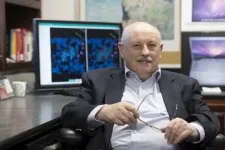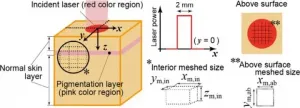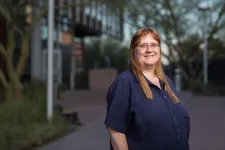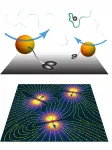(Press-News.org) An international team of researchers led by a University of Virginia School of Medicine professor is warning that scientists must better prepare for the next pandemic - and has developed a plan to do just that.
Noting the "avalanche" of scientific data generated in response to COVID-19, UVA's Wladek Minor, PhD, and colleagues are calling for the creation of an "advanced information system" (AIS) to help scientists integrate, monitor and evaluate the vast amounts of data that will be produced as researchers reveal the molecular architecture of the next pathogen posing a big biological threat. This information on the shape, structure, and function of a pathogen is essential to the development of medications, vaccines and treatments. For example, the COVID-19 vaccines now available target the "spike" protein on the surface of the SARS-CoV-2 virus.
Their heavily cited online resource for COVID-19 (https://covid-19.bioreproducibility.org/) demonstrates the usefulness of their approach and can be used as a foundation for the new research strategy, they say. The site includes carefully validated 3-D structural models of numerous proteins related to the SARS-CoV-2 virus, including many potential drug targets.
"Structural models and other experimental results produced by various laboratories must follow a standard evaluation procedure to ensure that they are accurate and conform to accepted scientific standards," said Minor, Harrison Distinguished Professor of Molecular Physiology and Biological Physics at UVa. "Standardized validation is important for all areas of biomedical sciences, especially for structural models, which are often used as a starting point in subsequent research, such as computer-guided drug docking studies and data mining. Even seemingly insignificant errors can lead such research astray."
Battling a Pandemic
One important role of AIS would be to identify structures that can be refined and improved, the researchers say. They were happy to note that inspection of the molecular blueprints produced for components of COVID-19 and deposited in the Protein Data Bank online database suggests that most were very good. Less than 1% needed significant reinterpretation and less than 10% could be optimized by moderate revisions.
Still, good buildings require good blueprints. The same is true with vaccines and disease treatments. It's critical, the researchers say, that the structural and other data for pathogens are as accurate as possible, and that scientists from various fields are speaking the same language when discussing and using them. The proposed AIS would help ensure conformity across disciplines.
"Almost 100,000 COVID-19-related papers have been published and over a thousand models of macromolecules encoded by SARS-CoV-2 have been experimentally determined in about a year. No single human can possibly digest this volume of information," Minor said. "We believe that the most promising solution to information overload and the lack of effective information retrieval is the creation of an advanced information system that is capable of harvesting results from all relevant resources and presenting the information in instructive ways that promote understanding and knowledge."
The researchers acknowledge that implementing their proposal would be a major undertaking. Other resources that sought to offer similar benefits on a smaller scale have already come and gone. That's why it's so important, the scientists say, that we act now. "Creating an AIS will undoubtedly require the collaboration of many scientists who are experts in their respective fields, but it seems to be the only way to prepare biomedical science for the next pandemic," the researchers write in a new scientific paper outlining their proposal.
"In the history of humanity, the COVID-19 pandemic is relatively mild by comparison with the bubonic plague (Black Death) that killed a hundred times more people," the researchers conclude. "We might not be so lucky next time."
New Approach Outlined
The researchers - from UVA, the National Cancer Institute, Poland and Austria -- have detailed their plan in an article in the scientific journal IUCrJ. The article is featured on the journal cover. The research team consists of Marek Grabowski, Joanna M. Macnar, Marcin Cymborowski, David R. Cooper, Ivan G. Shabalin, Miroslaw Gilski, Dariusz Brzezinski, Marcin Kowiel, Zbigniew Dauter, Bernhard Rupp, Alexander Wlodawer, Mariusz Jaskolski and Minor.
In their paper, the researchers gratefully acknowledged the financial support of the National Institutes of Health's National Institute of General Medical Sciences, grant R01-GM132595; the Polish National Agency for Academic Exchange, grant PN/BEK/2018/1/00058/U/00001; the Polish National Science Center, grant 2020/01/0/NZ1/00134; the Intramural Research Program of the NIH, National Cancer Institute, Center for Cancer Research; FWF (Austrian Science Foundation), grant P 32821; and the Polish National Science Centre, grant 2018/29/B/ST6/01989.
Minor and his longtime collaborator Zbyszek Otwinowski, PhD, of the University of Texas Southwestern Medical Center, were recently awarded the Tadeusz Sendzimir Applied Sciences Award by the Polish Institute of Arts and Sciences of America for their efforts to develop and promote software for biomedical applications in the structural biology field.
To keep up with the latest medical research news from UVA, subscribe to the Making of Medicine blog at http://makingofmedicine.virginia.edu.
INFORMATION:
URBANA, Ill. - Ever thought about buying or building a bat box to help bats? Think carefully about the design and where you put it, University of Illinois researchers say.
Here's why: Bats and their pups can overheat and die in poorly designed or placed bat boxes, and in a warming climate, it could happen more often.
Illinois bat ecologists Joy O'Keefe and Reed Crawford recently synthesized the available data on bat boxes, also known as bat houses or artificial roosts, to raise awareness of the issue and motivate change in bat box design, marketing, and consumer education. Their recommendations are published in Conservation Science and Practice.
"Conservation ...
A pilot human clinical trial conducted by researchers at Baylor College of Medicine reveals that supplementation with GlyNAC - a combination of glycine and N-acetylcysteine as precursors of the natural antioxidant glutathione - could improve many age-associated defects in older humans to improve muscle strength and cognition, and promote healthy aging.
Published in the journal Clinical and Translational Medicine, the results of this study show that older humans taking GlyNAC for 24 weeks saw improvements in many characteristic defects of aging, including ...
In the Arctic, climate change and pollution are the biggest threats to top predators like narwals. Studying the animals' tusks reveals that diet and exposure to pollution have shifted over the past half century in response to sea-ice decline. Human emissions have also led to a sharp rise in the presence of mercury in recent years, according to an international team of researchers.
"Our research shows that climate change is having substantial impacts on Arctic ecosystems, with consequences for exposure to toxic pollutants like mercury," says co-author Jean-Pierre Desforges, a Postdoctoral Fellow at McGill University under the supervision ...
Alexandria, Va., USA -- Asymptomatic carriage of SARS-CoV-2 is a potentially significant source of transmission, yet remains relatively poorly understood. The study "SARS-CoV-2 Positivity in Asymptomatic-screened Dental Patients" published in the Journal of Dental Research (JDR), investigated SARS-CoV-2 infection in asymptomatic dental patients to inform community surveillance and improve understanding of risks in the dental setting.
Thirty-one dental care centers across Scotland invited asymptomatic screened patients over the age of five to participate. During the patient visit, trained ...
Laser treatment is now commonplace across various fields of medicine including dermatology, where it is commonly used to remove scars, wrinkles, and freckles. The technology, however, has a major downside: despite continued improvements, medical accidents related to laser treatment has been on the rise, with studies revealing excessively high laser energy as the major cause of such accidents.
Assistant Professor Takahiro Kono from Shibaura Institute of Technology (SIT), Japan, whose research is focused on the mechanism of heat transfer involved in the interaction of laser light with biological tissue explains, "The difficulty lies in adjusting the laser conditions for each patient ...
A team of researchers led by UCL Great Ormond Street Institute of Child Health (ICH) and Great Ormond Street Hospital (GOSH) has found that metformin - a drug commonly used to treat Type 2 diabetes - can successfully reduce symptoms associated with tuberous sclerosis complex (TSC), including reduction in the frequency of seizures and the size of brain tumours.
The study, which also included teams from Royal United Hospitals Bath NHS Foundation Trust (RUH) and University Hospitals Bristol and Weston NHS Foundation Trust, recruited 51 patients with TSC who were randomly assigned a placebo or metformin for one year on a dose similar to that given for Type 2 diabetes.
TSC is a genetic disorder characterised ...
In order to develop more effective drugs against a range of cancers, researchers have been investigating the molecular structure of many diseased-linked enzymes in the body. An intriguing case in point is Taspase 1, a type of enzyme known as a protease. The primary duty of proteases is to break down proteins into smaller peptide snippets or single amino acids.
Taspase 1 appears to play a vital role in a range of physiological processes, including cell metabolism, proliferation, migration and termination. The normal functioning of Taspase 1 can go awry however, leading to a range of diseases, including leukemia, colon and breast cancers, as well as glioblastoma, a particularly lethal and incurable malignancy in the brain.
Because Taspase 1 dysregulation is increasingly ...
Use of vouchers and coupons offered by pharmaceutical companies to defray patients' out-of-pocket drug costs is concentrated among a small number of drugs. While these offsets significantly reduce patient costs, they are not targeted to patients who most need the price reduction, according to a study from researchers at the Johns Hopkins Bloomberg School of Public Health.
The researchers, in what is thought to be the largest study of its kind to date, analyzed tens of millions of pharmacy transactions by more than 600,000 people in the U.S. during 2017-19, in order to get a better sense of how vouchers and other point-of-sale copayment "offsets" are used. These coupons and vouchers come in many forms--some are offered online directly to customers, others by pharmacy ...
When you bump into someone in the workplace or at your local coffee shop, you might call that an "encounter." That's the scientific term for it, too. As part of urgent efforts to fight COVID-19, a science is rapidly developing for measuring the number of encounters and the different levels of interaction in a group.
At the National Institute of Standards and Technology (NIST), researchers are applying that science to a concept they have created called "encounter metrics." They have developed an encrypted method that can be applied to a device such as your phone to help with the ultimate goal of slowing down or preventing future pandemics. The method is also applicable to the COVID-19 pandemic.
Their research ...
A drop of food coloring slowly spreading in a glass of water is driven by a process known as diffusion. While the mathematics of diffusion have been known for many years, how this process works in living organisms is not as well understood.
Now, a study published in Nature Communications provides new insights on the process of diffusion in complex systems. The result of a collaboration between physicists at Penn, the University of Chile, and Heinrich Heine University Düsseldorf, this new theoretical framework has broad implications for active surfaces, such as ones found in biofilms, active coatings, and even mechanisms for pathogen clearance.
Diffusion is described ...





